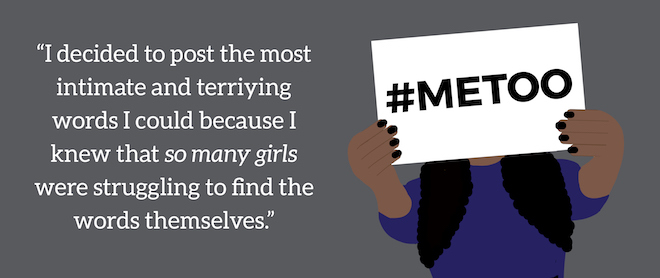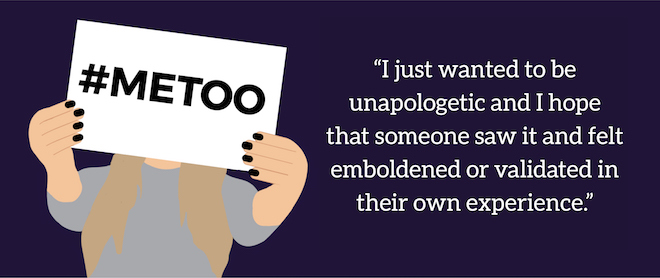On Oct. 15, in the wake of the Harvey Weinstein sexual assault allegations, actress Alyssa Milano tweeted the words that have now been viewed through millions of screens: “If you’ve been sexually harassed or assaulted write ‘me too’ as a reply to this tweet.” Within a day of the post, nearly half a million people had reposted the tweet or added their own stories to the hashtag #MeToo. Although recently trending, the movement is nearly 10 years old. It was created by Tarana Burke, an activist who originally started the movement to support women of color whom she feels are insufficiently served by existing sexual assault services.
Through its growing popularity, the movement has taken on different meanings for different people. This week, four Northwestern students told NBN what #MeToo means to them.
Audre Sorem Smikle, School of Communication Junior
“At first I really didn't want to post anything besides a simple ‘me, too.’ I was already dealing with trauma when the Harvey Weinstein story came out, but after seeing so many girls on my feed post ‘me, too,’ I was like, ‘fuck.’ I had no idea it was so many of my female friends and acquaintances that experienced on some level the same trauma that I had.

“I am a poet and I make a lot of art and I have actually done some songs, poems and paintings all about me dealing with this trauma and sadness. I wrote this poem specifically to post on Facebook, which is something I've never done, but words are how I deal with my issues and I am not ashamed of who I am and what I deal with. I struggle with depression and that's not something to be ashamed of. I decided to post the most intimate and terrifying words I could because I knew that so many girls were struggling to find the words themselves. [I wanted] to give my voice and have other people know that there's more people that are going through the same thing. The movement means a lot to me for a lot of reasons, mostly surrounding solidarity.
“The one thing that was really hard was to see one of the people who sexually assaulted me had liked the post. And I haven't talked to them about what happened, so it makes sense, it was just really hard to see that – to know that person doesn't even know I'm talking about them.”
I sometimes don’t believe it’s real / I try to convince myself that it didn’t happen / that I was fine / that maybe I was just lying / And I started to believe it / I convinced myself for months / that it wasn’t / a big deal / that I was fine / just / fine But trauma comes in waves / it comes when you’re not expecting it / it comes in class when you’re reading / a play by some kid / who clearly doesn’t understand / it comes when a teacher makes a strange comment / sometimes it’s just the way my friend / puts his arm around me / when he’s drunk / Sometimes / it’s nothing / Sometimes it just comes
Rebecca Levine, Weinberg sophomore
“I think what’s good about this movement is people don’t feel like it has to be a super extreme situation that happened to them to be able to share because there’s so much of the suffering. It’s not even okay to be catcalled at, let alone grabbed or touched, especially at a workplace or anywhere you’re supposed to feel safe. So I think it’s really important that we’re not just cutting off like ‘oh it’s fine until you hit this point.’
“Overall I feel like most women have been assaulted or harassed in some way. I know for me personally I was like, ‘wow, where can I begin? How many times have I been called at, grabbed at, felt unsafe? ...Even here at school.’
“I definitely feel like people shouldn’t feel obligated to share stuff like that about themselves, but I think it is powerful. I know especially for some of my male friends or family members, when they go on Facebook and so many women in their lives have shared this.”
Me, too
Ashley Hackett, Medill Junior
“It’s amazing that women are sharing their stories to try to bring awareness to their male friends, but it should not be our responsibility to publicly out ourselves as victims in order to make a change.
“I chose to post because I think that the guys in my life who know me ought to know that even their friend has been affected in this way. I can’t say if my post had much of an impact [on others], but I can say that other girls’ posts definitely had an impact on me."
A handsy coworker, repeated harassment… hearing derogatory things yelled at me on the streets of Chicago, straying hands on the L, overly enthusiastic "help with directions" from men in Spain, being told to not wear leggings as the leader of a club because it is "too distracting," receiving unsolicited (and frankly unnecessary) corrections on my form at the gym...these are all small things, but they add up. I'm here to say Me Too and to stand in solidarity with women everywhere. We deserve to be treated like humans, not sexual objects. Guys: You don't have to stop interacting with women altogether. You just have to be respectful - that's all we're asking.

Anonymous, SESP senior
“I just wanted to be unapologetic and I hope that someone saw it and felt emboldened or validated in their own experience.
“I expected to feel better afterwards but I felt more alienated. My thread was flooded with so many triggers and I could barely handle it, which is what inspired my post… I had to put the post on private later because I was afraid of retaliation.
“[On opening a Title IX investigation] I'm glad I made this decision. But I lost a lot of friends along the way who couldn't and wouldn't support me. My experience pressing charges in my criminal case hasn't been as positive, but I'm also trying to keep faith with that one. It's just a long road and oh so isolating.
“I want other people to know that pressing charges isn't easy but don't let that deter you if that's how accountability looks to you.”
I feel cheated. Cheated, because for every shoutout there is a perpetrator. The first time I was raped I did nothing but crawl away and lick my wounds - I was too ashamed. I was told nothing could be done, he lived too far away. But this time I’m coming for what I am owed. Now I know how difficult it is to show a system that doesn’t give a shit about you that you exist - that you breathe and shit and cry and love - and the wounds take long to heal and look, here they are, and look, I have the receipts! We don’t want your pity. We don’t want your shock, your sadness, your surprise. What rape culture needs to heal is all of our actions. We need to actively build a consent culture, and a big part of that demands accountability of perpetrators. And before we build a better accountability system, I will use what is at hand. And if you don’t want to help us, you can kindly shut the hell up.
While it’s easy to keep these issues in mind and while it’s trending on our newsfeeds, it’s an issue that will live on long after the hashtag has died down. In a recent interview with Ebony Magazine, Burke stated: “It wasn’t built to be a viral campaign or a hashtag that is here today and forgotten tomorrow. It’s a catchphrase to be used from survivor to survivor to let folks know that they are not alone and that a movement for radical healing is happening and possible.”
Snippets from original Facebook posts are marked by italics.